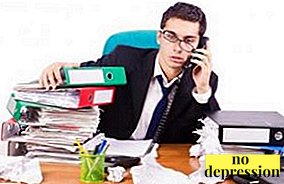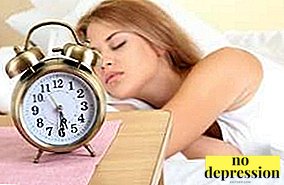Agitated depression - a type of depressive disorder, which is characterized by the presence of both the classic symptoms of depression - feelings of hopelessness, increased fatigue, loss of working capacity and interest in everything that surrounds - and agitation.
Agitation is inadequately increased motor activity, which is accompanied by anxiety, fear, and emotional arousal. This symptom is leading in the structure of the disease.
Causes of the disease
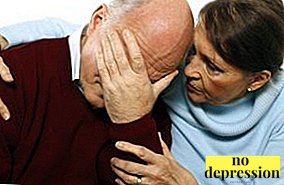
The main causes of agitated depression:
- Psycho-emotional shock, chronic or acute stress: death or serious illness of a dear person, divorce, loss of work, caring for a bedridden person, his own serious diseases (for example, cancer), a single acute episode of violence or systematic recurring episodes, problems and increased workload, the negative impact of a toxic environment ( criticism, humiliation, devaluation problems).
- Middle age crisis. It develops in adulthood, when a person begins to realize that old age is not far off, and everything that he dreamed of achieving in his youth has not been achieved. During this period, it becomes necessary to rethink a lot, find new priorities, accept yourself and the situation.
Depressive moods during a crisis are normal, but sometimes they turn into something more serious.
- Financial difficulties. Lack of funds limits a person, makes him feel inferior, especially if people in the circle of friends and acquaintances are more prosperous and successful.
- Personality Features. Depression affects people with low self-esteem, overly sensitive to criticism, predisposed to the development of mental disorders, anxious, suspicious.
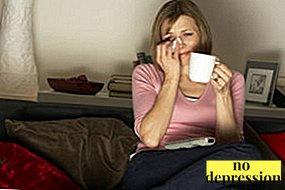 Somatic diseases. Some physical diseases, such as hyperthyroidism (hypothyroidism), hypertension, coronary heart disease, malignant and benign brain tumors, are often accompanied by depressive symptoms. Therefore, when symptoms of depression appear, it is necessary to undergo a medical examination and then, when it becomes clear that they are not related to physical illnesses, contact a psychotherapist.
Somatic diseases. Some physical diseases, such as hyperthyroidism (hypothyroidism), hypertension, coronary heart disease, malignant and benign brain tumors, are often accompanied by depressive symptoms. Therefore, when symptoms of depression appear, it is necessary to undergo a medical examination and then, when it becomes clear that they are not related to physical illnesses, contact a psychotherapist.- Loneliness. In most cases, long-term loneliness, especially in old age, adversely affects the human psyche and may become one of the causes of depression.
- Changes in life. Drastic serious changes (not only negative, but also positive or neutral) that occurred in life and require a person to rethink life, search for new priorities, can lead to the appearance of depressive symptoms. For example, retirement pulls a person out of the usual home-work regime, he is left alone with himself and gets a lot of free time, which is difficult to manage.
His experiences, which had previously been drowned out in vigorous activity, come to the fore, and depression develops.
The risk group includes:
- People of middle and old age. Agitated depression is not typical for adolescents and young people. Most often, it develops in those who have reached a midlife crisis or have stepped over it.
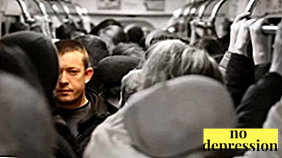 Women. In women, depression develops more often than in men, due to the nature of their psyche.
Women. In women, depression develops more often than in men, due to the nature of their psyche.- People living in large cities. Depressive disorder occurs less frequently in people living in rural areas, because there is a quieter life, not associated with an abundance of stress.
Symptoms and signs
The main symptoms inherent in this type of depression are:
- Agitation. A person at any time may begin to walk around the room, wave his hands, continuously change the position in which he is, run, look fussy, and full-fledged dialogue with him is difficult, because during this period his thinking does not work correctly.
It is difficult for him to control himself, so this symptom can manifest itself in any circumstances, even in those that require assiduity and calm.
- The presence of continuous alarm. In the early stages of the development of the disease, it is expressed moderately, but can later significantly increase. A person is worried about the premonition of something bad, expresses thoughts about something that can happen, and in some cases tries to dissuade loved ones from any actions and deeds that supposedly can bring trouble.
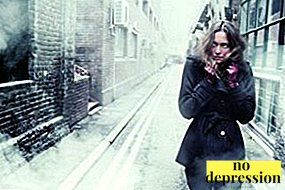 Speech disorders. The patient's speech changes, becomes less meaningful, the sentences become shorter, and he can repeat the same phrase many times. Since he is focused on his inner feelings, in conversations with him the subject related to his unreasonable anxieties continually slips.
Speech disorders. The patient's speech changes, becomes less meaningful, the sentences become shorter, and he can repeat the same phrase many times. Since he is focused on his inner feelings, in conversations with him the subject related to his unreasonable anxieties continually slips.- Rave. This is a kind of violation of thinking, in which a person gives out incoherent, illogical statements, which are closely connected with his internal anxieties and experiences. In patients with agitated depression, Kotar delirium is often observed, which is characterized by hypochondriacal statements of a fantastic nature. For example, a patient may state that worms crawl in his brain, or that he is actually long dead. Or that the world was gripped by a dangerous infection, in which people have rotted insides, and soon everyone will die. There may also be other types of delusions, such as paranoid delusions, persecution delusions.
- Melancholic raptus. This is an affective outbreak, during which a person, unaware of what he is doing, tries to harm himself, thus expressing his anxiety and hopelessness. During this period, he may try to hurt himself, trying to kill himself, may weep, roll on the floor, run around the room.
When agitated depression is in the initial stage of development, the melancholic raptus is less pronounced and manifests itself in the breaking of fingers.
Other symptoms characteristic of any depression are:
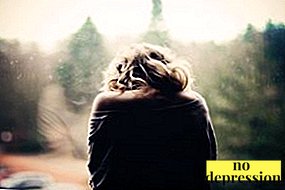 apathy;
apathy;- somatic abnormalities (headaches, problems in the functioning of the gastrointestinal tract - constipation, diarrhea, flatulence, pain, nausea, - weakness, drops in blood pressure, dizziness, pain in the heart, tachycardia, impaired potency, interruptions in the menstrual cycle);
- sleep disturbances (insomnia, jerky sleep, daytime sleepiness, sleep does not remove the feeling of tiredness);
- severe depression, despondency;
- constant feeling of fatigue, aggravated after little effort;
- emptiness, hopelessness;
- a sense of worthlessness;
- the feeling that life was in vain;
- loss, or, conversely, weight gain;
- loss of appetite or its strengthening, to the extent that a person tries to improve his mental state with food, so he eats a lot;
- suicidal thoughts, intentions, attempts to commit suicide;
- auto-aggression (self-inflicted pain - burns, scratching, skin piercing, hair pulling, and so on);
- tearfulness;
- irritability, even aggressiveness, often unreasonable.
A set of non-specific symptoms may vary depending on the individual characteristics of the patient.
Complications and consequences

If depression is not treated for a long time, she is getting worse, negatively affects the patient's personality, increases the likelihood of joining other mental illnesses, such as obsessive-compulsive, anxiety, panic disorders.
Also, advanced depression, like any other somatic or mental illness, is much more difficult to cure.
As the disease progresses, symptoms will worsen: for example, a melancholic raptus, which initially manifested itself moderately, may become more pronounced and will pose a serious threat to life and health.
Depression affects not only the human psyche, but also his physical health. Its influence on people older than 40-50 years is especially strong.
It aggravates the course of chronic diseases, becomes one of the causes of diseases of the gastrointestinal tract, cardiovascular, endocrine, nervous systems, increases the likelihood of Alzheimer's disease, dementia, stroke, heart attack.
Diagnostics
Under symptoms of agitated depression serious somatic pathologies may be hidingsuch as hyperthyroidism, benign and malignant neoplasms in the brain, vascular dementia.
Therefore, a person with depressive symptoms should be screened to ensure that his physical health cannot affect his mental health.
After that, it is important for him to talk with a psychotherapist or psychiatrist and pass the teststhat may be offered by them. Among them:
- Beck's scale and Zung scale, allowing to assess the level and features of depression;
- Spielberger's alarm scale;
- Luscher color test, which reflects the psycho-emotional state of the patient;
- Scale of alarm Shihan and Zung.

Tests can also be performed showing how cognitive abilities function. After this, the diagnosis is made and the treatment methods are determined.
Treatment
To psychotherapeutic treatment was successful, and the man quickly felt better, are appointed medicationsthat block the symptoms of depression. Among them:
- antidepressants (Prozac, Clomipramine);
- sedatives (motherwort tincture, Novo-Passit);
- neuroleptics (Haloperidol, Droperidol), but only in the presence of pronounced delusional states;
- benzodiazepines (diazepam, clonazepam).
But without psychotherapeutic help, drug therapy will have only a temporary effect.
In the treatment of agitated depression, use the following psychotherapeutic areas:
- cognitive behavior therapy;
- art therapy;
- hypnotherapy;
- gestalt therapy;
- psychodynamic therapy;
- existential therapy.

The psychotherapist helps the patient rethink the situation, look at it from different sides and find a way out. He also teaches him to deal with the symptoms of depression and to find strength for activities.
Middle-aged and elderly people may be skeptical about psychotherapy, and it is important to try to convey to them the idea that these are the same doctors as, for example, a therapist, cardiologist, traumatologist, simply work in the field of the human psyche and personality.
- Give examples from life: tell about familiar people who, having undergone a course of treatment, felt much better.
- Offer to take tests on the Internet, for example the scale of Zung or Beck. If a person sees that, according to the test results, he should visit a specialist, it can convince him.
- Find a qualified psychotherapist and show his site to a loved one so that he can get acquainted with the information.
- Show articles about psychotherapy, depression and anxiety.so that a person can better understand what is happening to him and how psychotherapists work.
- Explain that no one forcibly closes people in a mental hospital with depression. This practice has long disappeared.
Physiotherapeutic procedures (light therapy, therapeutic sleep, hydrotherapy), massage, and physical therapy have a positive effect.
Practical recommendations to people who have agitated depression:
- Do sports. If you do not like the classic exercise, you can do yoga or race walking. Physical activity favorably affects the physical and mental state, triggers the production of pleasure hormones, improves immunity.
- Adjust the mode of the day. It is necessary to get up and go to bed at a certain time, and it is important to sleep, especially in old age, at least 7-8 hours a day.
- Take a walk in the fresh air more often: A walk will have a positive effect on your well-being and will give you additional physical exertion.
- Change your diet so that it has enough nutrients. For example, a lack of vitamin B12 provokes the onset of depressive symptoms, especially in the elderly.
- Communicate regularly with close people who treat you kindly and warmly.
- Do businessthat bring joy or bring it before.

Prevention
Completely eliminate the risk of depression is impossible, but compliance with the recommendations will reduce it.
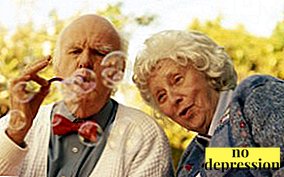 During a midlife crisis, don't let yourself be discouraged. If necessary, consult a psychologist to help him step over this difficult period.
During a midlife crisis, don't let yourself be discouraged. If necessary, consult a psychologist to help him step over this difficult period.- Listen to your mental well-being. If it has changed and you have begun to feel depressed and exhausted, it is important to go to the hospital in time to prevent deterioration.
- Give yourself enough rest and eat well. Regular sleep, adequate rest and good food at times reduce the risk of developing depression.
Modern psychotherapy in combination with properly selected medications can help most patients, even those who are depressed are in a state of neglect, and the sooner the treatment begins, the faster the person will feel happy and calm.
Difference between severe anxious agitated depression and psychosis:

 Somatic diseases. Some physical diseases, such as hyperthyroidism (hypothyroidism), hypertension, coronary heart disease, malignant and benign brain tumors, are often accompanied by depressive symptoms. Therefore, when symptoms of depression appear, it is necessary to undergo a medical examination and then, when it becomes clear that they are not related to physical illnesses, contact a psychotherapist.
Somatic diseases. Some physical diseases, such as hyperthyroidism (hypothyroidism), hypertension, coronary heart disease, malignant and benign brain tumors, are often accompanied by depressive symptoms. Therefore, when symptoms of depression appear, it is necessary to undergo a medical examination and then, when it becomes clear that they are not related to physical illnesses, contact a psychotherapist. Women. In women, depression develops more often than in men, due to the nature of their psyche.
Women. In women, depression develops more often than in men, due to the nature of their psyche. Speech disorders. The patient's speech changes, becomes less meaningful, the sentences become shorter, and he can repeat the same phrase many times. Since he is focused on his inner feelings, in conversations with him the subject related to his unreasonable anxieties continually slips.
Speech disorders. The patient's speech changes, becomes less meaningful, the sentences become shorter, and he can repeat the same phrase many times. Since he is focused on his inner feelings, in conversations with him the subject related to his unreasonable anxieties continually slips. apathy;
apathy; During a midlife crisis, don't let yourself be discouraged. If necessary, consult a psychologist to help him step over this difficult period.
During a midlife crisis, don't let yourself be discouraged. If necessary, consult a psychologist to help him step over this difficult period.